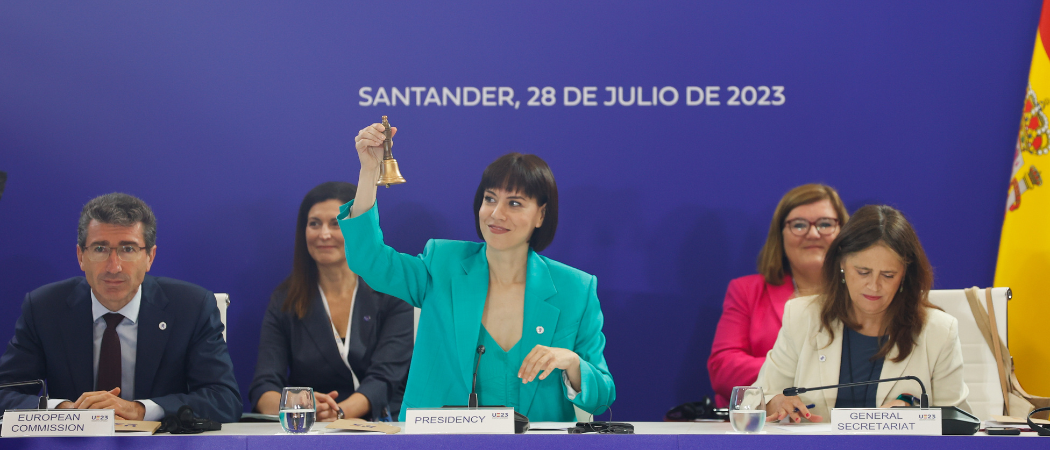Spanish presidency of the EU Council has held talks on the final three years of Horizon Europe, as policymakers start to set outlines for the successor seven-year research framework programme

Spain's minister for science and innovation Diana Morant Ripoll (centre), next to Marc Lemaître (left), director-general in the European Commission's directorate-general for research and innovation during an informal meeting in Santander on 28 July. Photo: European Union
EU research ministers discussed the next Horizon Europe strategic plan and science diplomacy in an informal meeting in Santander on Friday, with the feedback suggesting it was a fruitful discussion in which many ministers offered critical reflections on the future of EU research programmes.
Commission research chief Marc Lemaître was in the room as ministers discussed the Commission’s proposals to introduce a new Horizon Mission on the New European Bauhaus and ten new industrial partnerships in areas including brain health and forestry.
It seems few ministers are happy with the proposed new Mission on the Commission-led initiative to introduce a cultural aspect to Europe’s green deal ambitions. Further talks are to follow, with the future of the Mission hanging in the air, Council insiders say.
The case for forming new partnerships also came up, where there was a healthy dose of scepticism from member states, which only have a few months to rubberstamp the proposal put forward by the Commission in July. A decision is due by the end of the year.
Looking to the future beyond Horizon Europe, ministers underlined the need ensure research money isn’t funnelled to policy-driven initiatives that have little to do with research, such as parts of the EU Chips Act.
As Brussels starts shaping the next seven-year EU research framework, due to start in 2028, there’s a need to find a better way to ensure EU-funded research and innovation delivers impact without diverting money from research to policy implementation and over-prioritising near-market innovation projects, the meeting heard.
As the Commission has signalled in the last few months, the Widening programme is also in for a rethink. Some of the ministers from Widening countries stressed the need for a continuation of the initiative that seeks to bridge the east/west gaps in the EU’s fragmented R&I landscape. And everyone is on board with the need to improve the programme.
More support for science diplomacy
Another item on the agenda was science diplomacy. In 2021, the EU put forward a strategy on international science collaboration articulating a new approach in which the EU would be choosier over who it collaborates with, and for what reason.
Notably, the old ethos of “open to the world” was replaced by “open to most of the world”. However, progress with implementing the strategy has been slow, the ministers acknowledged on Friday.
The discussion reiterated the member states’ willingness to work on an EU joint framework for science diplomacy. Speaking on behalf of the Commission, Lemaître also underlined that Europe needs a joined up approach to science in the global race for tech supremacy that introduces concrete measures.
“I’m very pleased that today we could see from all the member states a strong ambition to set up a European science diplomacy framework to achieve such a coordinated action,” said Lemaître.
Following on from this, the Spanish presidency will hold the first European conference on science diplomacy in December.





 A unique international forum for public research organisations and companies to connect their external engagement with strategic interests around their R&D system.
A unique international forum for public research organisations and companies to connect their external engagement with strategic interests around their R&D system.